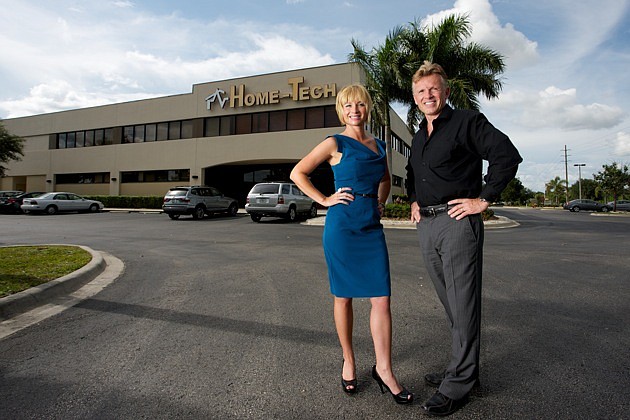- January 14, 2025
-
-
Loading

Loading

Ray Kroc, the founder of McDonalds, used to tell people he was in the real estate business and sold a lot of hamburgers.
Likewise, Steve Marino is in the insurance business and repairs a lot of appliances.
In 1985, four years after starting the Home-Tech appliance-repair business in Fort Myers, Marino realized that his customers were willing to pay for more than a quick fix. So he started selling them insurance against their appliances breaking down, betting that they wouldn't call him more than a couple times a year.
While he doesn't claim to have created the concept of service-agreement insurance, Home-Tech grew because of Marino's attention to following through with great service. Rivals such as Sears, which sold service agreements on specific appliances they sold, couldn't match Marino's efficiency and reliability.
Today, roughly 90% of Home-Tech's service calls are for customers who have such service agreements. Although he declines to cite customer numbers, Marino says Home-Tech made it through the recession because “thousands and thousands” of people sought certainty about appliance costs by buying service agreements.
Essentially, Home-Tech helps homeowners hedge against the exorbitant cost of appliance breakdowns. “Our renewals go up during the downturn,” Marino says, citing insurance renewal rates up about 88% today compared with 83% during the boom years.
Under the service agreements, Home-Tech customers pay between $339 and $479 annually to ensure that a technician will repair broken home appliances. The service agreements represented about 40% of the company's $14.8 million in revenues in 2010. So even if sales of appliances decline, Home-Tech has a steady source of insurance revenues that can carry it through economic downturns.
In addition, Marino is exploring ways that technology can make Home-Tech more efficient. For example, the company is working on a plan to monitor appliances remotely, sending a technician to make small adjustments early rather than waiting for a problem to get worse. Besides, that has the potential to wow the customer, Marino says.
Behind the agreements is a small army of 127 people, of which 55 are shareholders of the employee-owned company. They're driven by common ownership of the company, not to mention those quarterly dividend checks they receive.
Sarasota expansion
Marino has been eyeing an expansion to the Sarasota area for years, in part because he's had a successful foothold in the Venice area. Now, the company has invested $1.3 million in land and a new building further north in Lakewood Ranch that will house its growing operations. “We've been planning this for about five years,” says Marino.
Home-Tech bought the land in Lakewood Ranch in 2009, but held off on the building until recently because of economic uncertainty. Marino says he's moving ahead now despite tentative signs of improvement in the economy. The new building will be ready in January. “The world isn't going to end,” he says. “You need to get on with it.”
Marino says he prefers to expand this way than to acquire a competitor in the Sarasota area. “They either want too much [money] or the culture doesn't mesh,” he says. “I'd rather take their customers than buy them.”
What's more, land costs and labor availability have improved since the boom years. For example, in 2009 Marino paid $4 a square foot for the land at Lakewood Ranch that was listed for $12 a square foot in 2004. “That's the silver lining,” Marino says.
Home-Tech now receives 500 applications for its apprentice program compared with 50 during the boom. If it was lucky, two or three of the 50 applicants would be good enough to keep. Today, by contrast, “the quality of people out there is like I've never seen before,” Marino says.
Building a new facility tells customers in Sarasota that Home-Tech is committed to the area. What's more, employees there will feel better connected to the company, rather than just a Roman outpost. “I plan on being there more,” Marino says.
Marino says the Sarasota-Manatee area is similar to the Fort Myers-Naples market, with above-average-income households. “It has every possibility to be as successful as down here,” Marino says, with 10% to 30% annual growth. “We could double the business.”
However, now that government stimulus — such as credits for new appliances — have expired, Marino says a clearer picture of the Gulf Coast economy has emerged. Many sales in 2010 robbed from 2011, and he expects this year's sales to be flat.
And Marino doesn't expect the new Sarasota venture to be an overnight success, though funding it internally without debt takes off some of the pressure. “Business today is like drilling for gas in shale; it's more work,” he says. While technicians get an incentive for selling service agreements to customers who call without one, it's not an easy sell. “They take years to cultivate,” he says.
Barriers to entry
Marino says he's not overly concerned about new competition emerging because the barriers to entry into the business are high.
For example, the Florida Office of Insurance Regulation scrutinizes service-agreement policies such as the ones that Home-Tech sells. That kind of scrutiny requires audits and periodic reviews that would be cost-prohibitive for a startup, says Sonya Sawyer, 37, Home-Tech's chief financial officer and Marino's daughter.
Although Marino is the founder, president, chairman and largest single shareholder of Home-Tech, ownership is spread among 55 employees, and a seven-member board elected by shareholders makes collective decisions. “I've been outvoted many times on the board,” says Marino, 58, an accomplished ballroom dancer and airplane pilot. That doesn't bother him because he knows they have the same motivation he does. “Their life is invested,” he says. “If people don't have a stake, your key people are always looking somewhere else,” he adds.
Marino says he shares financial information with employee-owners and the company makes quarterly dividend distributions. Why the open book? “More eyeballs watching,” he explains.